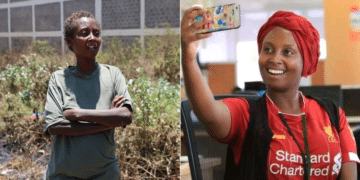Nasibo Kabale, once a celebrated journalist renowned for her insightful health reporting on NTV, is now facing a harsh reality on the streets of Nairobi.
Formerly a respected media figure, Kabale’s current situation is a stark contrast to her former life, marked by her disheveled appearance and the need to carry a knife for protection.
This dramatic shift has left many Kenyans deeply shocked and heartbroken.
The viral footage of Kabale reveals her struggles and the perilous conditions she endures daily.
In the video, she speaks candidly about how severe depression led her to leave her successful career and ultimately end up homeless.
“I have to sleep with a knife beside me because of the constant fear of being attacked,” she explains, highlighting the dangers of life on the streets.
Kabale’s downward spiral began after her extensive coverage of the COVID-19 pandemic, which earned her a Presidential Award in 2020.
The emotional strain of reporting on the pandemic’s devastation took a heavy toll on her mental health.
Despite receiving medical treatment and being prescribed antidepressants, her condition continued to deteriorate, contributing to her decision to leave Nation Media Group and later Standard Group due to inadequate compensation.
Her situation has raised significant concerns about the state of Kenya’s media industry, where many journalists face long periods without pay, exacerbating stress and mental health issues.
Kabale’s story has ignited a broader conversation about the mental health challenges faced by those in high-pressure professions.
Separated from her young daughter, who now lives with her father, Kabale’s plight has touched many hearts, prompting calls for increased awareness and support for mental health in Kenya.
Despite the adversity she faces, Kabale remains hopeful and expresses a desire to return to journalism if given the opportunity.
“I still have my passion for journalism.
If given another chance, I would dedicate myself fully to my work,” she said.
Kabale’s tragic fall underscores the urgent need for improved mental health resources and support systems for individuals in high-stress careers, highlighting a critical issue in Kenya’s professional landscape.
